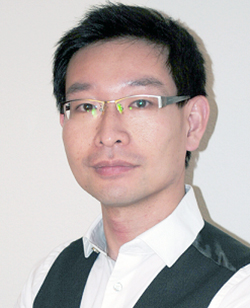University receives $516,000 NSF grant to enhance high performance computing
 Lamar University will enhance its ability to conduct leading-edge research and educational activities through a hybrid CPU/GPU high-performance computing cluster thanks to a $516,000 National Science Foundation Major Research Instrumentation grant.
Lamar University will enhance its ability to conduct leading-edge research and educational activities through a hybrid CPU/GPU high-performance computing cluster thanks to a $516,000 National Science Foundation Major Research Instrumentation grant.
“This grant will significantly enhance compute-intensive and data-intensive studies and greatly facilitate cutting-edge cross-disciplinary research and educational activities at LU by offering a shared state-of-the-art computing platform," said Jing Zhang, assistant professor of computer science who served as the principal investigator on the grant proposal titled “MRI: Acquisition of a Hybrid CPU/GPU High Performance Computing Cluster for Research and Education at Lamar University.”
“This would not have been possible without the impressive campus-wide support,” said Zhang, who credited the efforts of co-principal investigators Sujing Wang in computer science, Yueqing Li in industrial engineering, Tao Wei in chemical engineering (now with Howard University), and senior personnel Frank Qingguo Sun in computer science, as well as the support of the university’s research office, College of Arts and Sciences, College of Engineering, and computer science and industrial engineering departments.
In developing the proposal, Zhang and the group studied the computational needs of 22 faculty members from 11 departments, and received letters of support which greatly strengthened the proposal, prompting the NSF MRI grant proposal review panel to write “The range of research activities is impressive, spanning the social sciences, physics, chemistry, business applications, mathematics, computer science and multiple fields of engineering.”
Zhang, who holds a Ph.D. in computer science from the University of South Florida, and was a postdoctoral associate at Duke University before joining the faculty at LU, said high performance computing clusters (HPCC) have become an indispensable tool for faculty and researchers in many areas of research where exponential data growth means traditional computer servers and workstations are no longer adequate to handle the size and complexity of computational work needed. Without HPCC, faculty engaged in these projects must rely on resources at other institutions, and are often hampered in their efforts by limited bandwidth and competing priorities. Long waiting time delays the progress of projects, and limits collaboration between researchers at LU and other institutions, he said.
The awarded hybrid CPU/GPU HPCC will significantly enhance compute-intensive and data-intensive studies and facilitate discipline-specific and multidisciplinary research through a shared state-of-the-art computing platform, Zhang said. The instrumentation will strongly support LU's high priority current and future research needs as well as benefit a variety of regional academic institutions and industries.
The hybrid CPU/GPU HPCC will make it possible to deploy the best suited computing nodes to perform traditional CPU-based, GPU-based, and hybrid CPU/GPU-based data-intensive computing tasks at LU, which are extremely critical to advance knowledge and understanding of cutting-edge research projects and educational programs.
The instrumentation will support new creative research areas and establish new cross-disciplinary studies in the areas of imaging genomics, deep learning, big data, computational neuroscience, molecular physics, advanced materials research, scientific optimization, water and air quality analysis, transportation systems, electronic structure calculations, nucleic acid biomarker discovery and epigenetics, and many more.
As a shared research resource, the HPCC will not only promote cross-disciplinary collaborations among faculty members from different departments within the university, but also enable LU to promote and strengthen collaborative opportunities with other research institutions.
The instrument is also an essential educational tool with the potential to foster interest among faculty in the development of new courses that will integrate state-of-the-art research into undergraduate and graduate curricula. The HPCC will be available remotely around the clock to all properly trained and approved faculty and undergraduate and graduate students. Access to an excellent computing environment will broaden their knowledge and research experiences, Zhang said. “Ultimately, hands-on experience with Lamar’s HPCC will provide students with unique training that will increase their competitiveness in their future careers,” he said.
That educational experience will extend to local high school students who visit LU's Data Center and experience the power of the HPCC, showcasing the modern technology available to future researchers and engineers. Having this cutting-edge instrumentation will attract and encourage more students from local school districts to study in science, technology, engineering, and mathematics, Zhang said.
“Ultimately, this award will benefit the region as it boosts research that improves healthcare, adds to the quality of life and increases security,” Zhang said.


